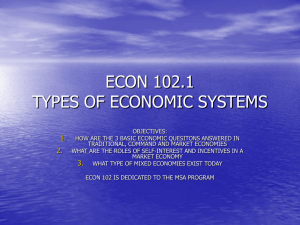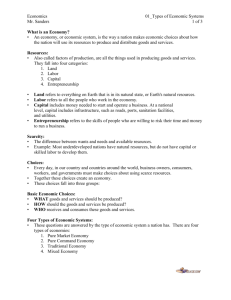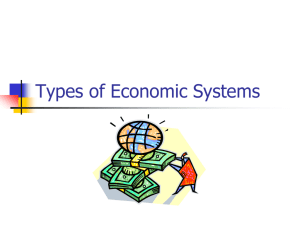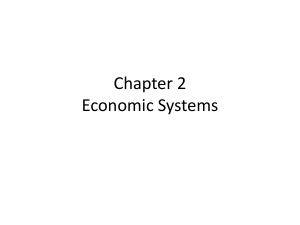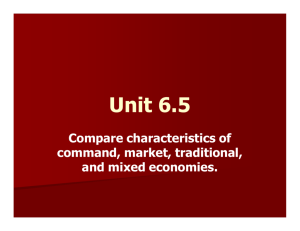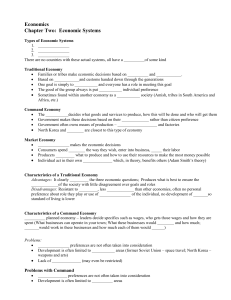Types of Economies
advertisement
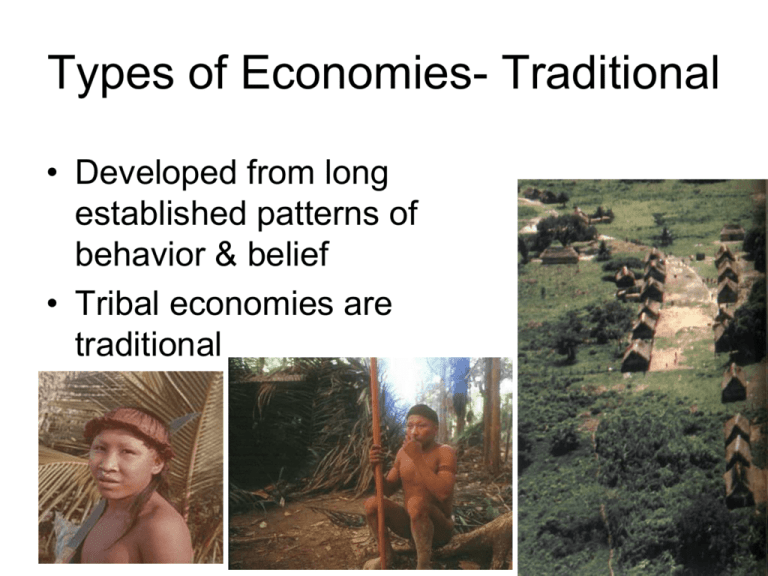
Types of Economies- Traditional • Developed from long established patterns of behavior & belief • Tribal economies are traditional Types of Economies- Command • Govt. decision making & control of resources • Egyptian economies with the Pharaoh • Lords in the Middle Ages controlling land & all resources • USSR Types of Economies-Market • Individuals allowed to control & allocate resources • Self interest controls the market economy (Adam Smith’s ideas) Most Economies-Mixed • China article description of their economy • Market Leninism, socialist market economy, authoritarian capitalism, dot communism, or Confucian capitalism Mixed Economies Authoritarian Socialism-Communism • Closest to pure Command – Authoritarian Socialism or Communism – Fidel Castro, Former Soviet Union, & North Korea Mixed Economies-Capitalism • Closest to pure Market is Capitalism • Individuals own the factories and industry • Some government regulation & taxes for services, but primarily private business operates freely Mixed Economies-Capitalism • United States, Japan, South Korea Mixed Economies Democratic Socialism • Democratic Socialism • Nations with systems between authoritarian socialism & capitalism • Government owns key industry like electric utilities, telephone Mixed Economies Democratic Socialism • Examples are Sweden, France, Poland • Sweden’s population pays about 50% tax United States Economic System • Follows the Market Model – Not a pure market economy – Has Some Government Involvement & Regulation – Worries now about how much governement United States Economic System • U.S. economy based on freedom to make choices – Called a Free-enterprise system Circular Flow Model-The Circular Flow Product Market Resource Market Six Main Goals of US Economy • 1. Economic Freedom • Heart of Freeenterprise – Consumers free to spend their incomes the way they want to – Workers are free to chose their occupations – Business people free to own their business Six Main Goals of US Economy • 2. Economic Efficiencymake the best of scarce resources • How many goods & services can our workers produce • The more products each worker produces the more efficient we become Six Main Goals of U S Economy • 3. Economic Equity-i.e.., ..... taxes (who pays, how much, what is fair) • Our tax system has to answer the questions of what is fair – Who pays? How much? • Environmental policies – What is fair in the deforestation policy Six Main Goals of US Economy • 4. Economic Security-keep individuals & organizations secure • Protect society members from poverty • Stop bank failures—protect our money • Social security questions Six Main Goals of US Economy • 5. Economic Stability-full employment & stable prices • Keep employment at a 95% level • Keep all prices stable – Runaway inflation – WWI German Mark Six Main Goals of US Economy • 6. Economic Growth-increase goods & services & provide good standard of living • Standard of living – Measured by how much the average person in a country is able to consume in given period of time—usually one year Bill Gates House Average residence West Bengal, India Standard of Living • Standard of living improves when production from each worker increases faster than total population Terms in Chapter 2 Section 2 • Private Property: What Are Property Rights YouTube • Contracts • Competition • Self-interested decisions • Producers • Consumers • Limited Government
